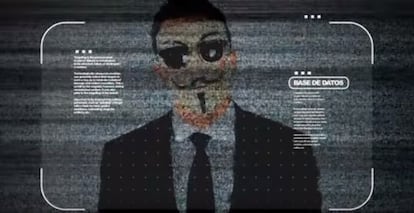Anonymous threatens a minor after he harasses a vagrant in Mexico
17-year-old turns himself into the authorities after being targeted by cyber-activism group


A Mexican teenager harassed, humiliated and abused a homeless man last week in Tijuana (northern Mexico) while his accomplice recorded a video of the attack. The images show the young man pointing a sharp object with the shape of a gun at his victim. Between insults and jokes, he forces the man to undress and get on his knees with his hands placed behind his head. Then the boy puts out a cigarette on his victim’s naked torso and orders him to say to the camera: “Hello to my friend Adal Mundo. Like it [on Facebook]!”
Seventeen-year-old Adal Mundo Rodríguez published the video on his social media profiles, where they were soon met with strong disapproval. The shock wave from this despicable act reached Anonymous, and the cyber-activism group decided to begin another internet crusade. In a video published via YouTube’s Mexican page, an individual wearing a face mask inspired by the Alan Moore comic V for Vendetta warns the perpetrators that they know their location and that, if they do not turn themselves in and apologize to the victim within two days, the group will take it upon itself to carry out justice.
Mexican officials have opened a case to investigate the allegations of physical assault
“We will make them pay for their deed, we will not allow repentance, and the pain that we will cause will be difficult to heal,” the speaker says in a robotic voice. The next day, Adal Mundo Rodríguez and his mother went to the assistant attorney general’s office in Tijuana.
On Tuesday, Mexican officials published a statement saying they had opened a case to investigate the allegations of physical assault and, since Rodríguez is underage, police have transferred his file to the juvenile justice system.
Anonymous, which became popular in 2010 for collaborating with the whistle-blowing organization WikiLeaks, said in the video that it had decided to step in because “racism, humiliation, torture and discrimination are crimes that should be punished. We are not afraid of your threats, and certainly not of ignorant people who act like members of criminal groups. You think that holding a firearm is synonymous with power, the same power that we will show you.”
The adolescent’s behavior is reminiscent of Mexican drug gangs and their sadistic practices. That image of powerful outlaws has left its imprint on the nation’s collective memory, particularly in a country with unbearable rates of impunity. The fascination with this kind of criminal has led to a phenomenon known as “narcoculture.”
As Mundo Rodríguez arrived at the assistant attorney general’s office in Tijuana, journalists stopped him to ask why he had behaved as he had.
“Just to play a game, to be with my friends...just to feel like a big shot,” he answered.
The teenager said several times that he was sorry for what he did. His mother, Carmen Rodríguez, added that since receiving the threat from Anonymous, which also mentioned the boy’s father and brother as responsible parties, the family had suffered a series of threats and insults on social media platforms and by telephone.
Homeless people are often treated with cruelty and contempt in Mexico. In June, six people were leaving a nightclub in Ensenada (northeast Mexico) when one of them decided to take a picture of another who was holding the end of a rope that was tied around a homeless man’s neck. The victim was naked from the waist up. One of the perpetrators is a university lecturer and the other is a government employee. That same week, two department store workers used water hoses to oust two homeless individuals who had sat down in front of the store.
English version by Dyane Jean Francois.
Tu suscripción se está usando en otro dispositivo
¿Quieres añadir otro usuario a tu suscripción?
Si continúas leyendo en este dispositivo, no se podrá leer en el otro.
FlechaTu suscripción se está usando en otro dispositivo y solo puedes acceder a EL PAÍS desde un dispositivo a la vez.
Si quieres compartir tu cuenta, cambia tu suscripción a la modalidad Premium, así podrás añadir otro usuario. Cada uno accederá con su propia cuenta de email, lo que os permitirá personalizar vuestra experiencia en EL PAÍS.
¿Tienes una suscripción de empresa? Accede aquí para contratar más cuentas.
En el caso de no saber quién está usando tu cuenta, te recomendamos cambiar tu contraseña aquí.
Si decides continuar compartiendo tu cuenta, este mensaje se mostrará en tu dispositivo y en el de la otra persona que está usando tu cuenta de forma indefinida, afectando a tu experiencia de lectura. Puedes consultar aquí los términos y condiciones de la suscripción digital.








































